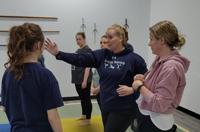It turns out that dipping yourself into a trendy ice bath may be good for your overall health.
A recently found polar plunging for seven days in a row significantly improved cellular resilience.
The concept of a polar plunge isn’t new, but many portable tub companies are jumping onto the trend to bring it to your backyard, with ones such as in 2023 to pitch for financial support.
University of Ottawa cold plunge theory
Why was the cold plunge theory put to the test? Study authors Kelli King and Ottawa University School of Human Kinetics professor Glen Kenny noted there have been several studies about heat acclimatization, or getting accustomed to higher temperatures, but few studies about cold acclimatization.
Humans are âinadequate at conserving body heat during exposure to cold temperaturesâ and will react with shivering and vasoconstriction, or the narrowing of blood vessels.
It was thought that exposing someone to cold temperatures would enhance cold tolerance and survivability, by delaying the reactions to the cold, like shivering.
For the study, 10 young men were put into cold-water immersion at 14 C for one hour across seven consecutive days. Blood samples were collected to analyze the participants’ cellular responses before and after the acclimation period. Their esophageal temperature was also measured.
However, not all 10 were able to consistently make it to the one-hour mark, as each day there was at least one who âterminated the cooling protocol prior to the end of the 60 minutesâ as they reached the maximum cutoff esophageal temperature of 35.5 C.
Study results - cellular cold tolerance
âOur findings indicate that repeated cold exposure significantly improves autophagic function, a critical cellular protective mechanism,â Kenny said in a press release. âThis enhancement allows cells to better manage stress and could have important implications for health and longevity.â
âBy the end of the acclimation, we noted a marked improvement in the participantsâ cellular cold tolerance,â King said. âThis suggests that cold acclimation may help the body effectively cope with extreme environmental conditions.â
The implications of this study extend beyond athletic performance, King noted.
With cold water immersion gaining popularity in the last decade for its potential health benefits, this research provides scientific backing for its efficacy.
The findings suggest cold exposure could not only extend cellular longevity, but also prevent the onset of various diseases, King noted.
âWe were amazed to see how quickly the body adapted,â King said. âCold exposure might help prevent diseases and potentially even slow down aging at a cellular level. It’s like a tune-up for your body’s microscopic machinery.â
More research would be needed to see how the cold therapy could work for other demographics.
An expert opinion
With many people touting the advantages of cold plunge exposure, fundamentals instructor Victoria Elliott said it was an interesting study, but more research is needed before applying the findings to a broader population.
âWe typically discourage practitioners from dipping for such a long period of time, primarily for safety reasons, but also because the people we’re teaching are usually just starting their practice, and anything more than a couple of minutes is more stress than they need to experience the benefits,â Elliott said. âFrom my own personal experience as a cold exposure enthusiast, I can tell you that I experience better mental resilience as a result of my practice, but I have no way of measuring my cellular health.â
Elliott noted there was a combined with cold water therapy, which examined the inflammatory response. The study showed that meditation, breathwork and cold exposure activated the sympathetic nervous system and enhanced the body’s anti-inflammatory response.
Error! Sorry, there was an error processing your request.
There was a problem with the recaptcha. Please try again.
You may unsubscribe at any time. By signing up, you agree to our and . This site is protected by reCAPTCHA and the Google and apply.
Want more of the latest from us? Sign up for more at our newsletter page.





















To join the conversation set a first and last name in your user profile.
Sign in or register for free to join the Conversation